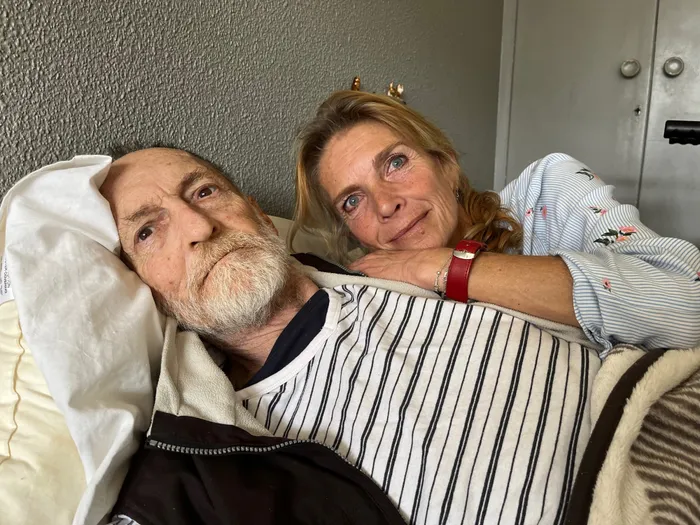Help Glenn walk again

Glenn and Kyleigh Rousseau in their Fish Hoek flat.
Every morning, Kyleigh Rousseau makes her way to a busy intersection where she is forced to beg to put food on the table for herself and her bedridden husband, Glenn.
If she is lucky, she will make R100, which she uses to take a minibus taxi home and buy some electricity, toilet paper and bread.
About three weeks ago, a motorist, Chris Botha, noticed Kyleigh, 58, at the intersection and offered to buy her a coffee and listen to her story.
She declined the coffee as she had to get back to Glenn, but she briefly told him their story.
After meeting Glenn, 65, a few days later, Chris decided to start a BackaBuddy campaign to help him get back on his feet.
Chris says the couple have been told that Glenn’s condition can be reversed through a series of very costly operations, and while they figure out how to get the funding for it, they need to make a living.
“Glenn’s pension and Kyleigh’s earnings from begging cover only a third of what they need to survive physically. The target for their survival is a modest R4 000 a month in addition to Glenn’s pension,” he says.
The Covid-19 pandemic dealt the couple a hard blow. They had lived in Bergvliet, where Glenn was a builder and Kyleigh, who has a degree in zoology, rehabilitated small, wild animals and restored antiques and collectibles, which she sold online.
Glenn had received two big contracts in February 2020 but could not work due to lockdown.
They sold what they could to try and make ends meet, but they became homeless and found themselves on the stairs of the Fish Hoek post office in February 2022.
Their luck changed in April last year when Glenn was given the opportunity to take over the care of the Garden of Remembrance from its former carer, who had been employed through the City’s expanded public works programme, and he and Kyleigh restored the garden to its former glory (“Garden of Remembrance restored to former glory,” Echo October 2022.)
However, in August last year, Glenn fell ill, and after being diagnosed with constipation three times by a local hospital, he was eventually diagnosed with a heart aneurysm by another hospital and was sent to Groote Schuur Hospital where he was operated on immediately.
“The doctors told me that my chances of survival were slim,” he says.
However, he pulled through but he has not been recovering as expected.
“He was just getting sicker and sicker. He was disorientated, had developed a fever, and was very weak,” says Kyleigh.
It was then found that the stent had gone septic and he had to have a heart bypass.
“All I remember about this time is the doctor saying we have to operate immediately,” Kyleigh says.
Glenn had numerous post-op complications, was disorientated most of the time and developed kidney and urinary tract infections.
“It was a very difficult time for him, and during his five-month recovery, he was tube-fed while lying in foetal position. He was always lying in the same position. On his side with his legs pulled up holding onto the bed,” says Kyleigh.
This resulted in his legs locking at a 90⁰ angle and when he was discharged in December last year, he was unable to walk.
Kyleigh says her husband walked into the hospital weighing 82kg and left in a wheelchair weighing 39kg.
He needs to take morphine every six hours to control his pain, and while the hospital supplies the morphine, the couple spend most of their income, Glenn’s state pension of R2 080, on other medication and nappies.
The couple lived at The Net before Glenn fell ill but could not return due to his condition. Kyleigh’s brother agreed to pay the rent for a bachelor’s flat in Fish Hoek.
While they now have a roof over their heads, they still need to buy food, electricity, and basic household items.
Kyleigh says it is difficult for her to consider even a half-day job as it is difficult for her to leave Glenn alone for more than two hours at a time as she is his only caregiver.
“The only way for me to supplement our income is to beg at the robots. When you get to the robot, you know you have to make money, but it is out of your hands. I've counted the cars and one out of a hundred cars will help you. Most people just ignore you. When I get R15, I know I can afford transport home. When I get more, I know I can get bread and so on.”
On some days, when Glenn is sick, she can’t go to the intersection and then they will eat whatever is left over from the previous day and spend the evening in darkness if she can’t buy electricity.
“This is just how we live. We have no choice,” she says.
Groote Schuur Hospital spokesman Alaric Jacobs confirmed that Glenn had been a patient at the hospital.
